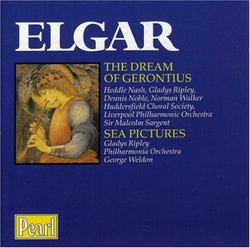| All Artists: Dennis Noble, Edward Elgar, George Weldon, Malcolm Sargent, Liverpool Philharmonic Orchestra, Philharmonia Orchestra of London, Heddle Nash Title: Elgar: The Dream of Gerontius / Sea Pictures Members Wishing: 0 Total Copies: 0 Label: Pearl Original Release Date: 1/1/1945 Re-Release Date: 3/27/2001 Genres: Pop, Classical Styles: Vocal Pop, Opera & Classical Vocal, Historical Periods, Modern, 20th, & 21st Century, Symphonies Number of Discs: 2 SwapaCD Credits: 2 UPC: 727031012825 |
Search - Dennis Noble, Edward Elgar, George Weldon :: Elgar: The Dream of Gerontius / Sea Pictures
 | Dennis Noble, Edward Elgar, George Weldon Elgar: The Dream of Gerontius / Sea Pictures Genres: Pop, Classical
|
Larger Image |
CD Details |
CD ReviewsBETTER THAN MANY DAVID BRYSON | Glossop Derbyshire England | 01/27/2005 (4 out of 5 stars) "Elgar inscribed the quotation `This is the best of me' on the score of Gerontius. Elgar also personally selected Heddle Nash to sing the part. This vintage reissue should be of the strongest possible interest to devotees of the work for the latter reason alone. I know it from LP, but technical considerations are not a major concern here and the recorded quality even on vinyl is astonishingly good and presumably has lost nothing in the transfer.
This recording dates from 1945, before the war was quite over, and it shows the best of everyone concerned. In his later years Sargent got a raw deal from critics, the public and especially from the cruel wit of Sir Thomas Beecham for his popularising of the classics, but he is a far better conductor than many were prepared to let on. I still prefer his version of Walton's first symphony (not seemingly available now) to the more famous one by Previn, and there is a quite magnificent live account from him with Sena Jurinac of the Strauss Four Last Songs that seems to me to rival even the celebrated Schwarzkopf/Szell reading. I am likewise enthusiastic about this Gerontius. Where Sargent seems to me outstandingly successful is in bringing light and shade to the score. In the prelude he keeps the tempo moving instead of trying to wring the last ounce of spirituality and solemnity out of it, but I back his approach. The entire first part of Gerontius can very easily stagnate in performance, and Sargent seems alive to this danger and skilful in avoiding it - throughout the whole section, not just in the prelude. He does not pull the tempo around, but there is great tact and sensitivity in his handling of it, and forward momentum is not allowed to lapse. Nash is quite superb, and remarkably well recorded. I like to think I would have found his voice absolutely right even if I had not known whose stamp of authority it carried. Gladys Ripley as the Angel should give nobody any problems, I very much hope. She is not in the `hooty' oratorio tradition of English mezzos/contraltos, her voice is fresh and appealing and she still does very well with the occasional low notes. Norman Walker is likewise well cast in the small part of the Angel of the Agony. More of the orchestral detail than you might expect comes through the 60-year-old sound, and the balance has been very well handled indeed. Part-way through the second half the sound seems to recede a little, but this soon passes. It would be a bit much to expect the great cry of `Praise to the Holiest' to make the kind of effect it can do nowadays, but even it is not badly dealt with at all. No doubt this is mainly an issue for collectors, but I would tentatively recommend it to a wider public than that. Nash has totally unique authority, for one thing, and the sound manages to do him justice. Well worth at least sampling, and in my own opinion well worth owning." |

 Track Listings (10) - Disc #1
Track Listings (10) - Disc #1